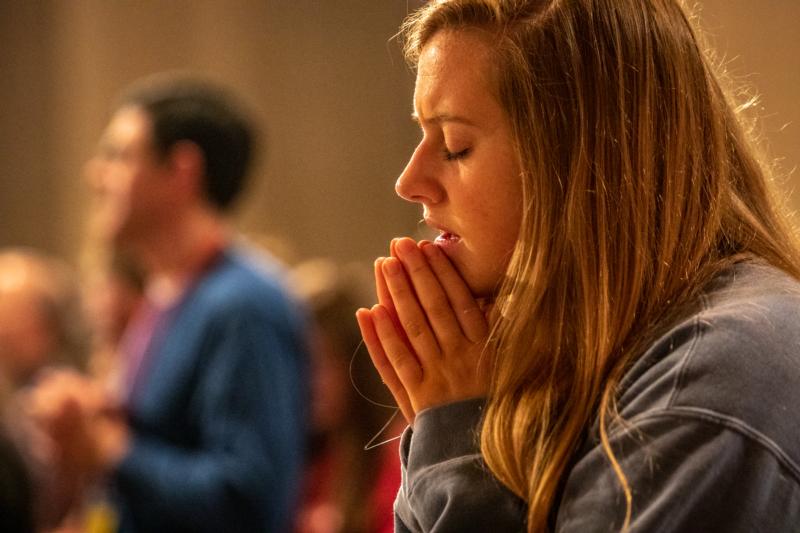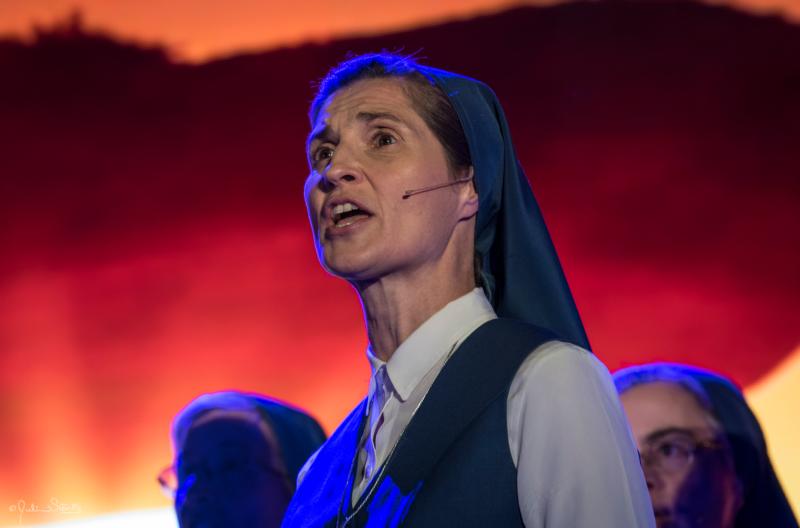As Catholics, our lives shift a bit during the season of Lent, as is visibly marked on Ash Wednesday with ashes on our foreheads. Something is different about this time of year. And it should be.
Lent offers us a time to take stock of our lives, question our motivations, examine our relationships and pray more attentively, opening ourselves to God’s actions in our lives. The ashes on our face remind us that we are not gods, we will not live forever and this life has a purpose.
As odd as it may seem when Catholics go around with dirt on our faces, the symbol speaks louder than words, to the point that non-Catholics are heading to churches on Ash Wednesday — Feb. 26 — this year to have that sacramental reminder. We know there is something more than this material world in which we bumble around every day.
We long for the spiritual dimension of our existence since we are made of both spirit and matter. When we can pause from our crazy technologically wired existence, we realize that we need to go deeper, to center ourselves and to commune with God. We need prayer — deep prayer.
This is why the church offers us the three pillars of the Lenten season: prayer, fasting and almsgiving. Prayer, first.
Lent is like one long retreat. If you’ve ever made a silent retreat, you know it is hard to rush from our busy lives to be still, silent and receptive to the Lord. It takes a few days to unwind, to calm the distractions and to become aware of God’s presence.
This is what the church calls us to during the season of Lent. It is a time to recognize how God works in our everyday existence and how his grace sustains us through the challenges of life. But we can only do that when we enter into conversation with him. This takes effort and discipline, which is what Lent is about.

Prayer requires of us a time to slip away either physically or mentally to a place where there are fewer distractions and life is calmer.
Jesus did that. After teaching the exhaustive crowds and healing hundreds of people who came to him, Jesus would go up to the mountain to pray (Mt 14:23).
He would remove himself from all the people and find a quiet, secluded moment to commune with his Father.
Sometimes we have to get away — pop into a dimly lit church, walk in a quiet park, sit silently with a cup of coffee in a corner of the house or at our desk.
We can pray the rosary, read the Scriptures or the daily Gospel as in “lectio divina,” or share our concerns and desires with the Lord, just as we imagine Jesus did with the Father.
There is no right or wrong way to pray. Just do it! But life offers many distractions.
The approximated need to always be connected and information-curious distracts us from taking time for prayer. We fill up our time waiting in lines or for the bus by playing games on our phones or catching up on the latest Netflix series instead of simply being, reflecting and/or praying.
Digital demands make sitting quietly in prayer a challenge. Who hasn’t reached for their phone while trying to pray? “Let me see if my email was answered,” or “I have to text a reminder to so and so about tonight,” or “Let me check to see if anyone beat my game score.” Come on!
We all can admit to doing this. We are human and our phones have become a collective addiction! Even more of a reason for us during this season of Lent to step back to reflect on what is happening in our lives outside of the digital universe.


Connecting with God, our Creator and Redeemer, can be so life-giving, literally! It can focus us, put our lives back on track and calm our hectic existence.
When Jesus says, “When you pray, go to your inner room, close the door and pray to your Father in secret. And your Father who sees in secret will repay you” (Mt 6:6).
He is calling us out of our distractions. He challenges us to be silent to make our needs known to God but more important, to listen to him.
As challenging as that is today, we can’t really blame only our devices. Being human is to avoid going deeper. We naturally want to remain on the surface because going inward requires effort and we would much rather seek out distractions to avoid the hard stuff of life.
Being quiet with the Lord means we must face our hurts, anger, disappointments and fears. But, when we take the courage to bring this before the Lord in silent, trusting prayer our lives change. The heavy burdens are lifted and grace spills over our hearts.
The Lord desires us to turn to him in all our needs, and Lent is the perfect time to recommit ourselves to do this daily. Let’s take up the prayer challenge and discover a more peaceful and grace-filled existence this Lent.


— Sr. Nancy Usselmann, FSP, Catholic News Service. Sr. Nancy Usselmann is a Daughter of St. Paul and the Director of the Pauline Center for Media Studies in Los Angeles.
She is a media literacy education specialist, theologian, international speaker, writer, film reviewer and blogger for bemediamindful.org and catholicmom.com. Her book, “A Sacred Look: Becoming Cultural Mystics,” is a theology of popular culture.





